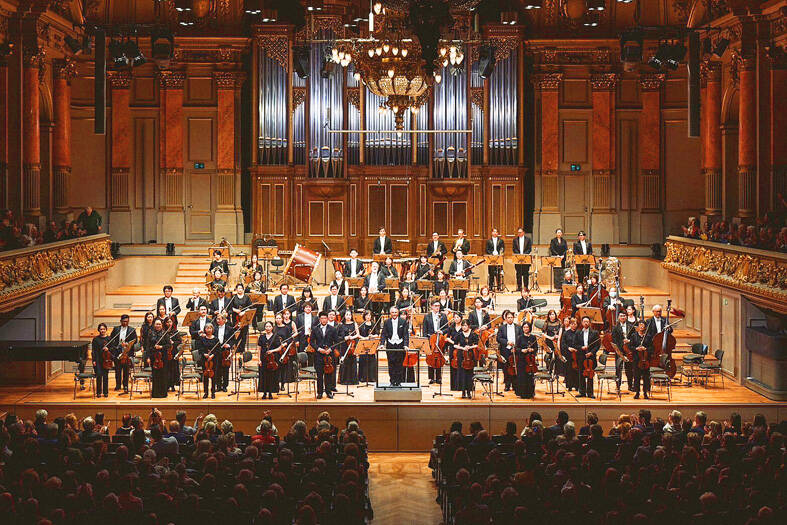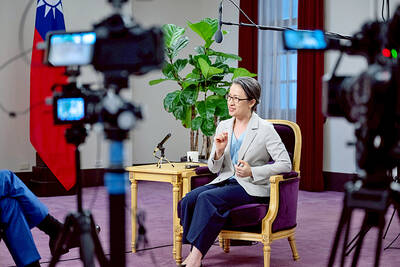The National Symphony Orchestra received a standing ovation for its first concert in Zurich, Switzerland, on its current European tour, affirming the group’s aim to “make friends in the world with music from Taiwan,” its executive director said.
National Symphony Orchestra executive director Kuo Wen-chen (郭玟岑) on Thursday said that the concert at the Tonhalle Zurich was 95 percent full and many in the audience gave a standing ovation at the end.
The orchestra, which performs abroad under the name Taiwan Philharmonic, opened its first concert in its seven-stop European tour with Taiwanese composer Li Yuan-chen’s (李元貞) Tao of Meinong, and was then joined by pianist Khatia Buniatishvili for Piano Concerto No. 1 in B-flat minor Op. 23 by Pyotr Ilyich Tchaikovsky.

Photo courtesy of the orchestra via CNA
Li’s piece, a symphony that incorporates Hakka folk music, was featured on the orchestra’s US and Japanese tours last year.
The orchestra then played Antonin Dvorak’s Symphony No. 8 in G-major Op. 88 for the second half of the concert, before performing two encore pieces — Dvoak’s Slavonic Dance, Op. 46, No. 8 and Taiwanese composer Tyzen Hsiao’s (蕭泰然) The Angel from Formosa, a statement released by the orchestra said on Thursday.
Switzerland-based cellist Yang Wen-sinn (楊文信) said he was moved by Li’s piece because it reminded him of Asia, as his family was from Taiwan before moving to Europe, the orchestra said in the statement.
He also praised conductor Jun Markl, music director of the orchestra, for his elegant delivery and Buniatishvili’s excellent guest performance, the statement said.
The orchestra played its second concert of the tour in the Victoria Hall in Geneva on Thursday. It played at the Stadtcasino Basel yesterday and is to head to Germany for another three concerts, at the Staatstheater Braunschweig today, Elbphilharmonie Hamburg on Tuesday, and Kuppelsaal in Hannover on Friday.
The tour is to conclude with a concert at the Theatre des Champs-Elysees in Paris on Saturday, the orchestra said.

China might accelerate its strategic actions toward Taiwan, the South China Sea and across the first island chain, after the US officially entered a military conflict with Iran, as Beijing would perceive Washington as incapable of fighting a two-front war, a military expert said yesterday. The US’ ongoing conflict with Iran is not merely an act of retaliation or a “delaying tactic,” but a strategic military campaign aimed at dismantling Tehran’s nuclear capabilities and reshaping the regional order in the Middle East, said National Defense University distinguished adjunct lecturer Holmes Liao (廖宏祥), former McDonnell Douglas Aerospace representative in Taiwan. If

TO BE APPEALED: The environment ministry said coal reduction goals had to be reached within two months, which was against the principle of legitimate expectation The Taipei High Administrative Court on Thursday ruled in favor of the Taichung Environmental Protection Bureau in its administrative litigation against the Ministry of Environment for the rescission of a NT$18 million fine (US$609,570) imposed by the bureau on the Taichung Power Plant in 2019 for alleged excess coal power generation. The bureau in November 2019 revised what it said was a “slip of the pen” in the text of the operating permit granted to the plant — which is run by Taiwan Power Co (Taipower) — in October 2017. The permit originally read: “reduce coal use by 40 percent from Jan.

‘SPEY’ REACTION: Beijing said its Eastern Theater Command ‘organized troops to monitor and guard the entire process’ of a Taiwan Strait transit China sent 74 warplanes toward Taiwan between late Thursday and early yesterday, 61 of which crossed the median line in the Taiwan Strait. It was not clear why so many planes were scrambled, said the Ministry of National Defense, which tabulated the flights. The aircraft were sent in two separate tranches, the ministry said. The Ministry of Foreign Affairs on Thursday “confirmed and welcomed” a transit by the British Royal Navy’s HMS Spey, a River-class offshore patrol vessel, through the Taiwan Strait a day earlier. The ship’s transit “once again [reaffirmed the Strait’s] status as international waters,” the foreign ministry said. “Such transits by

Taiwan is doing everything it can to prevent a military conflict with China, including building up asymmetric defense capabilities and fortifying public resilience, Vice President Hsiao Bi-khim (蕭美琴) said in a recent interview. “Everything we are doing is to prevent a conflict from happening, whether it is 2027 or before that or beyond that,” Hsiao told American podcaster Shawn Ryan of the Shawn Ryan Show. She was referring to a timeline cited by several US military and intelligence officials, who said Chinese President Xi Jinping (習近平) had instructed the Chinese People’s Liberation Army to be ready to take military action against Taiwan